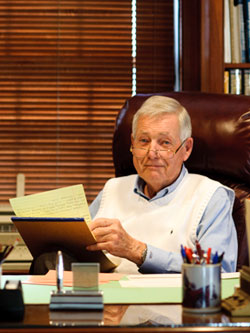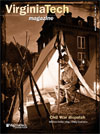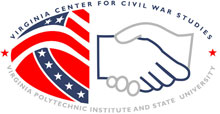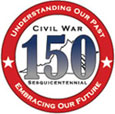 |
|
||||||
|
|
||||||||||||||||||||||||||||||||||||||||||||||||||||||||||||||||||||||||||||||||||||||||||||||||||||||||||||||||||||||||||||||||||||||||||||||||||||
|
JAMES I. ROBERTSON JR.
by RICHARD LOVEGROVE
"It was almost hilarious," Robertson told students in his Civil War and Reconstruction class two days later. "Anyone could figure out it's not true [that slaves fought for the Confederacy]. Patently false. "Anyway, here we are back in reality," Robertson concluded and launched into his lesson for the day. The native Southerner mixed humor, first-person stories, curious facts, and insight into the psyches of the people who started and fought the war that cost the United States up to 700,000 lives and in large part shaped the nation as we know it today. Robertson's teaching style and enthusiasm for history have inspired and enthralled students in packed lecture halls since the 1960s. But that facet of his illustrious career will come to an end when he retires in spring 2011. In 43 years, he's explained the relevance of the Civil War to an estimated 22,000 Hokies. Robertson will leave an impressive legacy. Since coming to Blacksburg, Robertson has written more than 20 books, built the Virginia Tech Special Collections' Civil War research holdings, and produced print and video material that has shaped Civil War history education in Virginia's public schools. "I've known Bud for more than 40 years, and he was one of my heroes when I was a youngster just getting into the business," said William C. "Jack" Davis, VCCWS's director of programs and a professor of history at Tech. "In the state, he's known as Mr. Virginia Tech and Mr. Civil War. Nothing in the state concerning the Civil War happens without consulting him. He's cast a big shadow over Civil War studies." Most importantly to Robertson, he has left an indelible impression on countless students. "The first Civil War book I ever owned was the textbook for [Robertson's class]. Thirty-three years later, I still have that textbook and more than 1,500 other Civil War books," said Albert Mackey (political science '79), who went on to a military career and now lives close to Gettysburg, Pa. "Professor Robertson ignited a lifelong interest in me for the Civil War. ... He's such an engaging lecturer that you want to just sit and listen, and you forget to take notes." "By far, his class was my favorite class at Virginia Tech," said Kris Berg Risendal (communication '79). "He is the most outstanding teacher I have ever known." "That's what you spend a lifetime working for," Robertson said of his students' reactions. "I take them by the hand, and we walk down the road to war. I make history human. It's full of emotion. It's not memorization of dates and places." The Civil War was never far away during Robertson's childhood. He was raised in Danville, Va., the last capital of the Confederacy. As a child, he listened to his grandmother talk about her father's exploits, including surviving Pickett's Charge at Gettysburg. Pursuing a master's degree and doctorate at Emory University, he studied under Bell Wiley, who taught the war through the experiences of the common soldier rather than the generals. Robertson was just 31 when he was suddenly thrust into national prominence in 1961. President John F. Kennedy was disturbed by regional fractures in the national Civil War centennial observation and was upset that it had become a celebration of war and battles rather than a commemoration. So he purged the commission and tapped Robertson as executive director. "The feeling was they wanted to bring in a young historian with the energy to go all around the nation and try to bring everybody back together again. We were seemingly on the verge of another civil war in 1961," said Robertson, who worked with 34 state and 100 local centennial commissions during his tenure as director. In 1967, Robertson interviewed at Virginia Tech and then accepted the job offer, but not because of the university's reputation in Civil War academic circles. It had almost none; the reputation was his to build. Robertson's friendship with J. Ambler "Uncle Ambler" Johnston, a 1904 and 1905 graduate and primary architect of the university's neo-Gothic look, prompted Johnston to purchase 1,100 rolls of microfilm containing the compiled service records of all Virginia Confederate soldiers, a donation that suddenly brought researchers and genealogists to Blacksburg in droves. The collection now houses 7,000 to 8,000 books and is considered one of the world's top Civil War monograph collections outside of the Library of Congress, according to Davis and Robertson. Robertson added his own classic to the collection with the 1997 release of Stonewall Jackson: The Man, the Soldier, the Legend, which took seven years to research and write. "[Robertson's] biography on Stonewall Jackson is the definitive work on Jackson; we understand him as a human being and not as a caricature," said Steven E. Woodworth, professor of history at Texas Christian University. The book was used as the foundation for the portrayal of Jackson in the movie "Gods and Generals," and Robertson served as the chief historical consultant for the film. Fifty years after his leadership role with the centennial, Robertson is serving on Virginia's sesquicentennial commission and will chair a conference, Military Strategy in the American Civil War, at Tech. In preparation for the 150-year milestone, he served as executive producer of the Emmy-nominated DVD set, "Virginia in the Civil War: A Sesquicentennial Remembrance," which was distributed free to every school in Virginia. "I'm very proud of [the DVD set]," Robertson said. "It's one of my greatest achievements." Robertson also enjoyed what amounts to a second career in athletics—enough, in fact, to earn him a place in Virginia Tech's Sports Hall of Fame. He officiated Atlantic Coast Conference football for 16 years, served as secretary-treasurer of the College Football Association and president of the former Metro Conference, and was faculty chair of athletics and president of the Virginia Tech Athletic Association, helping guide the Hokies into the Big East and chairing the search committee that selected Frank Beamer as head football coach. For his most recent project, Robertson is reworking the 350 radio pieces he recorded over the years for the university's radio station, WVTF, into 151 written pieces for a National Geographic Society book. Moreover, in November, he married Betty Lee, who Hokies might know from her work with Alumni Association chapters. The couple plans to travel the country by train after retiring. "He is a national treasure," said Richard J. Sommers, senior historian of the U.S. Army Heritage and Education Center at the U.S. Army War College. "One of his hallmarks is his willingness to share knowledge and understanding with such a broad range of people and not just to a clique of Civil War historians or academics. ... Students at Virginia Tech have a great privilege to learn from such a giant in the profession." Although thousands of Tech students agree, they're not the only ones who will feel a void. "I'm going to miss the classroom," Robertson said. "A professor is as young as his students if he has the right attitude."
|
|
|||||||||||||||||||||||||||||||||||||||||||||||||||||||||||||||||||||||||||||||||||||||||||||||||||||||||||||||||||||||||||||||||||||||||||||||||||
|
|
||||||||||||||||||||||||||||||||||||||||||||||||||||||||||||||||||||||||||||||||||||||||||||||||||||||||||||||||||||||||||||||||||||||||||||||||||||




